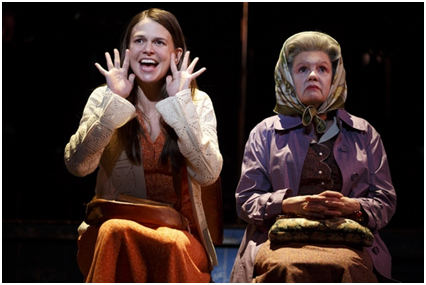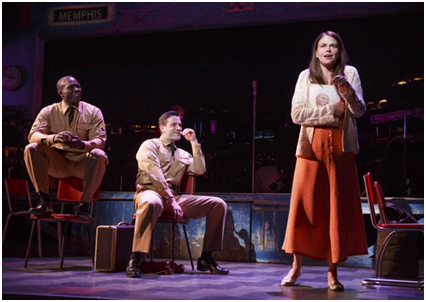Violet
To sum up, this is recommended to anyone who is at least a little adventurous: though not a complete success in its storytelling neither does it demand you shut off your brain before you can enjoy it. And Sutton Foster is a joy forever.

Sutton Foster and Annie Golden in a scene from Violet (Photo credit: Joan Marcus)
[avatar user=”Eric Grunin” size=”96″ align=”left” ] Eric Grunin, Critic[/avatar]The lovely revival of the 1997 musical Violet, presented by the Roundabout at the American Airlines Theatre, is of particular interest to fans of actress Sutton Foster and composer Jeanine Tesori, and it’s sure to bring them new fans as well. Violet was Tesori’s first musical, created with bookwriter and lyricist Brian Crawley. It was begun when they were students in the BMI Music Theater Workshop, receiving a Richard Rodgers Production Award which in turn led to a well-received five week run at Playwrights Horizons in February 1997. It’s had many regional productions since, and so this year’s Tony eligibility committee very reasonably decided it was a revival.
That first run picked up awards, including an Obie for Tesori’s score, but talk of a Broadway transfer came to naught. Last summer, Tesori curated an Off-Broadway series for Encores!, and was asked to include Violet. She was not entirely comfortable with the idea, but in the end it happened as a one-night-only event, directed by Leigh Silverman with Sutton Foster in the title role, and it was received rapturously. It’s probably no coincidence that the Roundabout organization subsequently announced Violet‘s belated Broadway debut, and with Foster and Silverman, too.
The musical is based on the widely anthologized short story, “The Ugliest Pilgrim” by Doris Betts. Crawley and Tesori kept the underlying structure: Violet Karl (Sutton Foster), a 25-year-old woman with a terrible scar on her check, has decided to go to a televangelist faith healer to have him remove with she considers to be the hideous mark on her face. So she gets on a bus, travels nearly a thousand miles west to Tulsa, is not healed, and gets back on the bus to go home. That’s it. There is no antagonist, no moment of decision, no surprises. The stakes are only that she wants is to look and feel “normal,” although living alone on her mountain she may measure normal by what she sees in movie magazines.
The scar is from an accident when she was thirteen years old. In flashbacks, we meet Young Violet (Emerson Steele) and her father (Alexander Gemignani), and learn that an axe head came loose while he was out chopping, causing the grievous wound. We are not shown the scar but must imagine it; this has the virtue of allowing us to identify with the heroine, as most of us have for at one time or other felt abnormal or even freakish. With all that as a given, the true drama of the story is in watching this otherwise intensely isolated woman as she goes out into the world for the first time as an adult, in particular how she strikes up a friendship of sorts with two soldiers she meets on the bus, the white Monty (Colin Donnell) and the black Flick (Joshua Henry).

Joshua Henry, Colin Donnell and Sutton Foster In a scene from Violet (Photo credit: Joan Marcus)
Crawley and Tesori’s adaptation made two particularly interesting changes. First, they moved the setting from 1969 to 1964, so that the prospect of the soldiers being sent to Vietnam is more ambiguous. Second, they expanded the part of Flick, so now the script gets to touch more pointedly on race.
By itself, Crawley and Tesori’s decision to stick with an odd structure for their show might seem naive, especially as it’s not completely successful. However Tesori keeps going for these special-case stories, with the similarly dissimilar Caroline, or Change and Fun Home. You have to credit Tesori for having guts, and at a time when it really counts: now more than ever, the typical Broadway musical clings so desperately to formula, convention, and cliché that the lack of new ideas is constantly on the verge of suffocating the business as well as the art.
Tesori went on to write music for Broadway hits Thoroughly Modern Millie (2002) and Shrek (2008), along with critical successes Caroline, or Change (2002) and Fun Home (Off-Broadway, 2013). If you’re familiar with those shows, you might know that they each inhabit a different musical world, and that Tesori’s a musical chameleon, in this case basing her style on Country and Western (with some gospel at times). The harmonic vocabulary of most Country and Western can be numbingly limited, and Tesori is careful to expand unobtrusively.
Yes, Violet is imperfect. Much of it takes place on a bus, or in a hotel room, so it needs to feel a little hemmed in. This single-set production, designed by David Zinn, shows a barn converted to a truck stop, with the band at the back, and chairs and tables moved on and off to suggest the bus or a coffee shop. A bed rolls out to create the hotel room. This sparseness is efficient, but feels too relaxed and decompressed, not at all claustrophobic. It may be in keeping with the notional scar, but sometimes “minimalist” fades into “generic.” An inherent problem with the show, it’s possible that even a small Broadway house like this one (740 seats) will always be too big.
The climactic sequence, following Violet’s discouraging experience in Tulsa, takes place mostly in Violet’s head and as such is almost unstagable, and in any case hard to understand. Last and most problematic is that these soldiers react relatively casually to Violet’s allegedly repellent deformity.

Emerson Steele and Ben Davis in a scene from Violet (Photo credit: Joan Marcus)
For this production they’ve added a new song (Monty’s “You’re Different” is now “Last Time I Came to Memphis”) and removed the intermission. Tesori has said that she and Crawley never wanted the intermission in the first place. Possibly related to that are a lot of small cuts to the text, bringing the whole down to 105 minutes.
This is a great step forward for Ms. Foster. After a string of broadly comedic roles (The Drowsy Chaperone, Young Frankenstein, Shrek, and Anything Goes), she finally gets a part which deals in real emotions, and she’s fully up to it. Particularly winning are the scenes where she gets to be the one who’s smart, practical, or stubborn. (She never goes so far as to be tough or gritty, but it would be interesting to see her try one day.)
It’s not just Foster’s show by any means – it’s also a breakthrough for Joshua Henry. In The
Scottsboro Boys and Porgy and Bess, he was passionate and powerful, but here his singing reaches a new height, every phrase infused with character, never just well-sung notes. Donnell as Monty does well with a character who is inherently less interesting than Violet or Flick, delivering the new “Last Time I Came to Memphis” with memorable strength. As the Preacher, Ben Davis has only a short scene with Violet, yet in those few moments conveys a lifetime of disappointment and profound self-loathing. Annie Golden is having a wonderful time as the hotel hooker, and she lets us know it. Finally, we should single out 14-year-old Emerson Steele as Young Violet for her clear delivery, a great virtue. There are a couple of moments when Violet and Young Violet move in unison, and each time is just a bit magical.
To sum up, this is recommended to anyone who is at least a little adventurous: though not a complete success in its storytelling neither does it demand you shut off your brain before you can enjoy it. And Sutton Foster is a joy forever.
Violet (through August 10, 2014)
American Airlines Theater, 229 W. 42nd Street, between 7th and 8th Avenues, in Manhattan
Running time: one hour 45 minutes including one intermission






Leave a comment